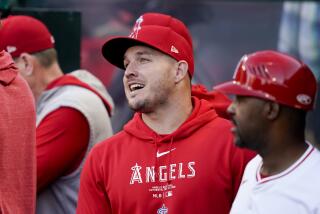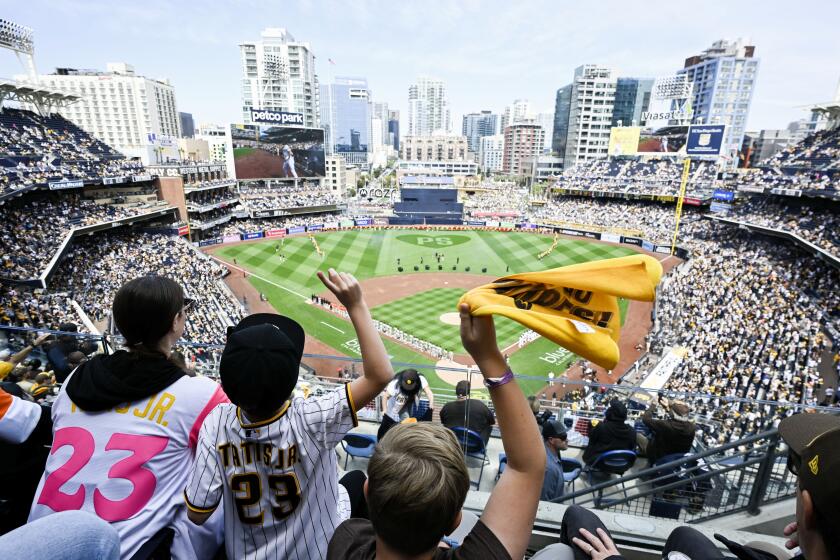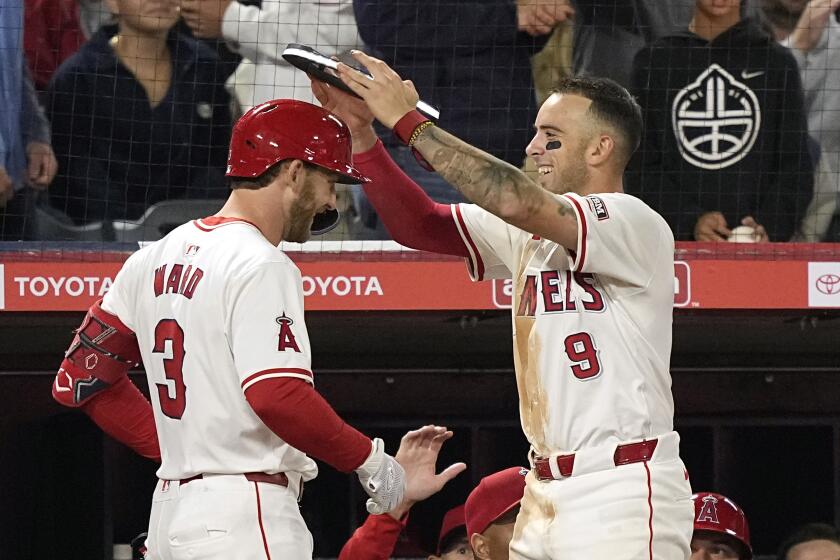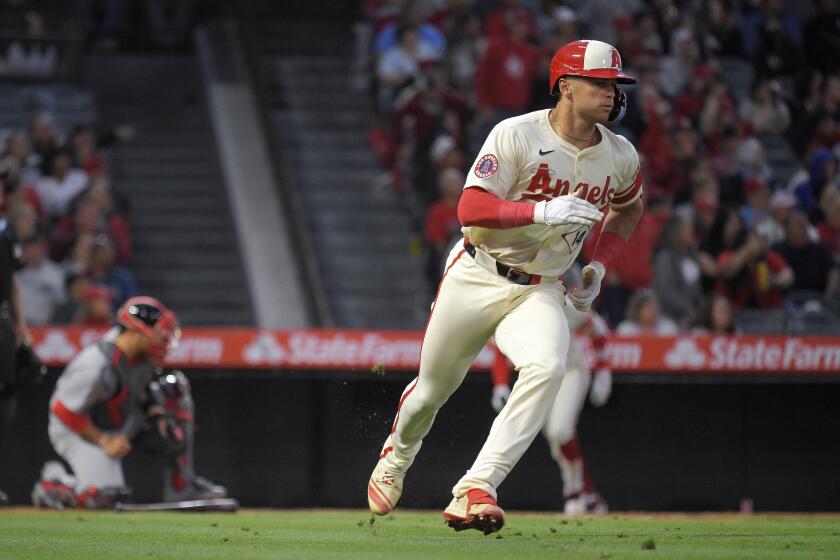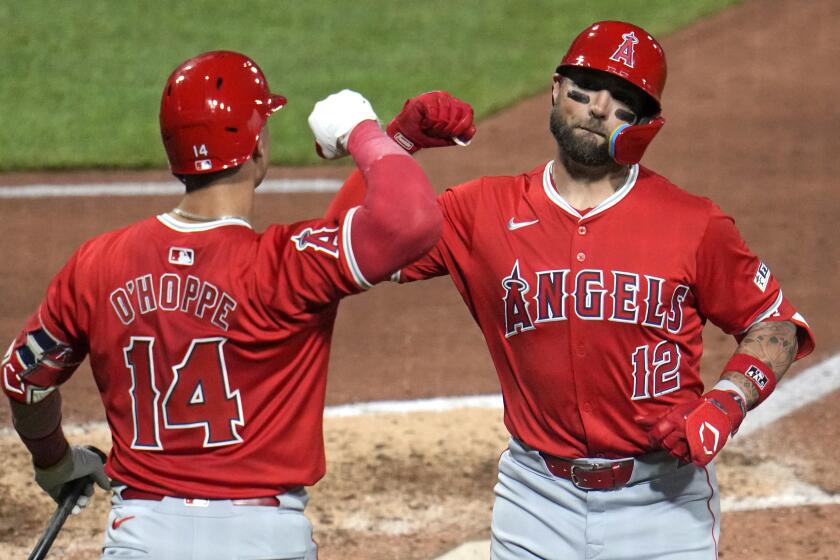Timing’s Nice for Escobar
Jose Molina has caught Kelvim Escobar long enough to know just the word to describe the Angel right-hander’s vast repertoire.
“Nasty,” the Angel catcher said. “I think, how can a guy have five different pitches, and all of them are so good? It’s hard to imagine, but he does.”
Jeff Mathis, the Angel rookie who will share the catching job with Molina this season, has seen enough of Escobar’s split-fingered fastball to call it “disgusting.... It’s downward with a little run. It’s pretty hard to hit.”
Bud Black, the Angel pitching coach, said with the stuff Escobar has, “there’s no reason he can’t win 15 to 20 games.”
Escobar’s response: “Why not?”
For as deep and potent an arsenal as Escobar possesses -- he features a 94-mph sinking fastball, a darting split-fingered fastball, a sharp-breaking slider, a tumbling curve and a solid changeup -- the 29-year-old right-hander from Venezuela has never won more than 14 games and has had only two winning records the six times he has spent the full season in the big leagues.
But knowing his elbow is free of the pain caused by the bone spur and chips that were surgically removed last June, knowing his spot in the Angel rotation is secure, and knowing he can harness all of his weapons effectively has given Escobar a feeling of supreme confidence this spring, that he’s just hitting his stride as a pitcher.
“I’ve been around a long time, and you learn every year,” said Escobar, who is entering his 14th professional season. “I think I’ve gotten to a point where I know what I’m doing out there, I know what it takes to get guys out. I don’t have to overpower guys. I just have to make pitches.
“The most important thing is I’m more mature. I’m not the Kelvim I was a couple years ago, where I couldn’t throw strikes, where I’d fall behind in the count and pretty much say, ‘Here’s the fastball.’ Now, I can throw all my pitches for strikes and I have a good game plan.”
Good enough to win 20 games?
“I have the abilities to do it,” Escobar said. “I just have to stay healthy, be consistent and get some help from the team.”
That last part, as Escobar learned in 2004, is no given. After signing a three-year, $18.75-million deal with the Angels, who assured him he would not be shuttled between the rotation and bullpen as he was in Toronto, Escobar pitched brilliantly in 2004, finishing 10th in the American League in earned-run average (3.93), fourth in strikeouts (191) and eighth in batting average against (.244).
But for some strange reason, the Angels rarely hit on the days Escobar pitched.
The Angels were shut out 10 times in 2004; five of those came on days Escobar started. They averaged 3.74 runs a game when Escobar pitched, the least run support of any starter on the staff.
Despite being “the lead dog in the rotation,” as Manager Mike Scioscia called him, Escobar went 11-12. Bartolo Colon, who had a 5.01 ERA, struck out 158 and allowed opponents to hit .265, went 18-12.
Escobar never criticized his teammates. Only once all season, when he declined to speak to reporters after a mid-September start, did his frustration even show.
“If you go down, you go down together, as a team,” Escobar said. “In every head is a different world, but to me the word ‘team’ means you stick together, you do whatever it takes to win.”
Escobar turned those words with action again in 2005. Shoulder and elbow problems wrecked Escobar’s first half, and his June 29 surgery shelved him for July and August.
As Escobar began to gear up for his return, a once-stout Angel bullpen began to crack, and the rotation, thanks in part to Escobar’s replacement, rookie Ervin Santana, continued to shine.
Escobar, a former Blue Jay closer, agreed to go to the bullpen, and in nine September relief appearances he went 1-0 with one save and a 1.89 ERA, providing a key ingredient in the Angels’ run to their second straight division title.
“That tells you what kind of guy he is, that he’ll do whatever it takes to win,” set-up man Scot Shields said. “I was struggling at that point. When he came back, it really gave us a boost. He’s a pretty legitimate starting pitcher, and for him to go down the bullpen helped a lot.”
For Escobar, it was a no-brainer.
“I just wanted to be part of a pennant race, to get to the postseason,” said Escobar, who hopes to re-sign with the Angels after this season. “The bullpen was struggling, and I knew I could help Shields and [Brendan] Donnelly as a middle relief or set-up guy. It didn’t take me long to get the mind-set of what it takes to be a reliever, because I did it for five years.”
Escobar pitched in four of the Angels’ five division series games against the New York Yankees, giving up one earned run in seven innings, but misfortune found him again in the American League championship series.
Though he dominated at times against the Chicago White Sox, striking out 10 in 4 1/3 innings, Escobar was tagged with two losses.
He struck out five before the controversial Josh Paul/Doug Eddings third-strike call in Game 2 and then gave up a game-winning RBI double to Joe Crede.
In Game 5, Escobar tried to swipe A.J. Pierzynski with a tag but forgot to put the ball in his glove, a gaffe that extended an inning in which the White Sox, behind Crede’s two-run homer off Escobar, rallied to take the lead.
“That was tough,” Escobar said. “I only gave up one earned run and lost two games. How does that happen?”
But with a little more luck and perhaps a little more determination, Escobar could be a Cy Young Award contender this season.
“He has to come to the park every day and truly believe in that potential,” Black said. “He has to have the mind-set of ‘I’m on a mission to win games, I am capable of doing something special, and I’m going to do it.’ ”
More to Read
Go beyond the scoreboard
Get the latest on L.A.'s teams in the daily Sports Report newsletter.
You may occasionally receive promotional content from the Los Angeles Times.
